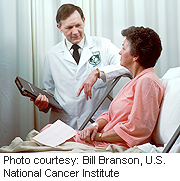- 8 Ways to Increase Dopamine Naturally
- 7 Best Breads for Maintaining Stable Blood Sugar
- Gelatin vs. Collagen: Which is Best for Skin, Nails, and Joints?
- The Long-Term Effects of Daily Turmeric Supplements on Liver Health
- Could Your Grocery Store Meat Be Causing Recurring UTIs?
- Are You Making This Expensive Thermostat Error This Winter?
- Recognizing the Signs of Hypothyroidism
- 10 Strategies to Overcome Insomnia
- Could Artificial Sweeteners Be Aging the Brain Faster?
- Techniques for Soothing Your Nervous System
Many People Not Told Cancer Tests Can Lead to ‘Overtreatment’


MONDAY, Oct. 21Most patients are not being informed by their doctors of the possibility that they could be overdiagnosed and overtreated as a result of their cancer screenings, researchers say.
Although cancer screenings can detect disease at an earlier stage when it’s more treatable, they can also detect cancers that will never progress and cause symptoms. Researchers in Germany cautioned that detection of these slow-growing cancers could result in unnecessary surgery, chemotherapy and radiation.
Study authors Odette Wegwarth and Gerd Gigerenzer, of the Max Planck Institute for Human Development in Berlin, gave 317 U.S. men and women ranging in age from 50 to 69 years an online survey to find out how many had been told by their doctor about the possibility of overdiagnosis and overtreatment. They were also questioned about how much overdiagnosis they would tolerate when deciding to undergo an initial or follow-up cancer screening.
The findings were published in the Oct. 21 online edition of JAMA Internal Medicine.
The researches found that 9.5 percent of the participants were told about the possibility of overdiagnosis and overtreatment by their doctor. Of those surveyed, 51 percent said they were unprepared to start a screening that results in more than one overtreated person for every one life saved from cancer, the investigators noted in a journal news release.
The study also showed, however, that almost 59 percent of the participants said they would continue to undergo the routine cancer screening they already receive — even if they learned that the test results in 10 overtreated people for every one life saved from cancer.
“The results of the present study indicate that physicians’ counseling on screening does not meet patients’ standards,” the study authors concluded.
More information
The U.S. National Cancer Institute has more about screening and testing to detect cancer.
Source: HealthDay
Copyright © 2026 HealthDay. All rights reserved.










